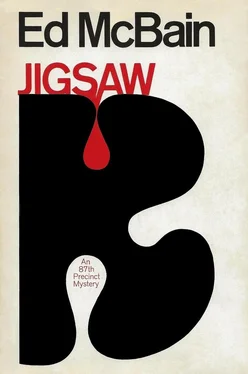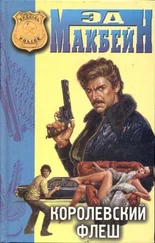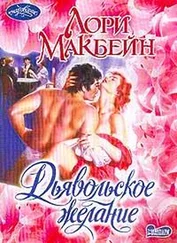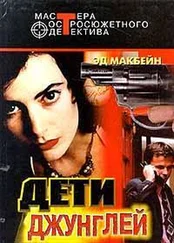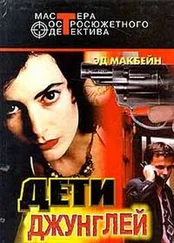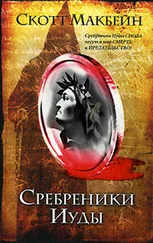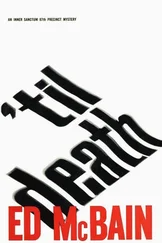“Is that your name?” Suzie asked. “I had an uncle named Cotton.”
“That’s my name,” Hawes said.
“After Cotton Mather?”
“That’s right.”
“Isn’t that a coincidence?” Suzie said. “I think that’s a marvelous coincidence.”
“You got anything else to ask?” Meyer said again.
“Well... yes,” Hawes said, and looked at Meyer.
“I’ll wait for you outside,” Meyer said.
“Okay,” Hawes said.
He watched as Meyer picked his way through the milling girls in the shop, watched as Meyer opened the front door and stepped out onto the sidewalk.
“I have only one further question, Suzie,” he said.
“Yes, what’s that?”
“Would you like to go to a movie with me? Or something?”
“Oh, no,” Suzie said. “Irving wouldn’t like that.” She smiled and looked up at him with her big brown eyes. “I’m terribly sorry,” she said, “really I am, but Irving simply wouldn’t like that at all.”
“Well, uh, thanks a lot for your cooperation, Miss Endicott,” Hawes said. “Thank you very much, I’m sorry we — uh — broke into your day this way, thanks a lot.”
“Not at all,” Suzie said, and rushed off to another beautiful brunette who was emerging from yet another dressing room. Hawes looked at the brunette, decided not to risk further rejection, and went outside to where Meyer was waiting on the sidewalk.
“Did you score?” Meyer asked.
“Nope.”
“How come? I thought it was a sure thing.”
“So did I. I guess she thinks Krutch is just adorable.”
“I think you’re just adorable,” Meyer said.
“Up yours,” Hawes answered, and both men went back to the squadroom. Hawes typed up the report and then went out to talk to a grocery store owner who had a complaint about people stealing bottles of milk from boxes stacked up in back of the store, this in the wee hours of the morning before the store was opened for business. Meyer went to talk to an assault victim and to show him some mug shots for possible identification. They had worked long and hard on the Weinberg Case, yeah, and it was now in the Open File, pending further developments.
Meanwhile, on the ferry to Bethtown, two other cops were working very hard at sniffing the mild June breezes that blew in off the River Harb. Coatless, hatless, Carella and Brown stood at the railing and watched Isola’s receding skyline, watched too the busy traffic on the river, tugboats and ocean liners, a squadron of Navy destroyers, barges and scows, each of them tooting and chugging and sounding bells and sending up steam and leaving a boiling, frothy wake behind.
“This is still the cheapest date in the city,” Brown said. “Five cents for a forty-five-minute boat ride — who can beat it?”
“I wish I had a nickel for all the times I rode this ferry with Teddy, before we were married,” Carella said.
“Caroline used to love it,” Brown said. “She never wanted to sit inside, winter or summer. We always stood here on the bow, even if it meant freezing our asses off.”
“The poor man’s ocean cruise,” Carella said.
“Moonlight and sea breezes...”
“Concertina playing...”
“Tugboats honking...”
“Sounds like a Warner Brothers movie.”
“I sometimes thought it was.” Brown said wistfully. “There were lots of places I couldn’t go in this city, Steve, either because I couldn’t afford them or because it was made plain to me I wasn’t wanted in them. On the Bethtown ferry, though, I could be the hero of the movie. I could take my girl out on the bow and we could feel the wind on our faces, and I could kiss her like a colored Humphrey Bogart. I love this goddamn ferry, I really do.”
“Yeah,” Carella said, and nodded.
“Sure,” Robert Coombs said, “I used to have a piece of that picture.”
“Used to have?” Brown asked.
“ Used to have, correct,” Coombs said, and spat on the sidewalk in front of the hot-dog stand. He was a man of about sixty, with a weather-beaten face, spikes of yellow-white hair sticking up out of his skull like withered stalks of corn, an altogether grizzled look about him as he sat on one of the stools in front of his establishment (Bob’s Roadside) and talked to the two detectives. The hot-dog stand was on Route 24, off the beaten path; it was unlikely that a dozen automobiles passed the place on any given day, in either direction.
“Where’d you get it?” Carella asked.
“Petey Ryan give it to me before the holdup,” Coombs said. His eyes were a pale blue, fringed with blond lashes, overhung with blond-white brows. His teeth were the color of his brows. He spat again on the sidewalk. Brown wondered what it was like to eat food prepared at Bob’s Roadside.
“Why’d Ryan give it to you?” Carella asked.
“We was good friends,” Coombs said.
“Tell us all about it,” Brown suggested.
“What for? I already told you I ain’t got the picture no more.”
“Where is it now?”
“Christ knows,” Coombs said, and shrugged, and spat.
“How long before the holdup?” Carella said.
“How long what? ”
“When he gave you the picture.”
“Three days.”
“Petey came to you...”
“Correct.”
“And handed you a piece of a snapshot...”
“Correct.”
“And said what?”
“Said I should hang onto it till after the hit.”
“And then what?”
“Then he’d come collect it from me.”
“Did he say why?”
“In case he got busted.”
“He didn’t want to have the picture on him if the police caught him, is that it?”
“Correct.”
“What did you think about all that?” Brown asked.
“What should I think? A good friend asks me to do a favor, I do it. What was there to think?”
“Did you have any idea what the picture meant?”
“Sure.”
“What did it mean?”
“It showed where they was ditching the loot. You think I’m a dope?”
“Did Petey say how many pieces there were in the complete photograph?”
“Nope.”
“Just told you to hang onto this little piece of it until he came to collect it?”
“Correct.”
“Okay, where’s the piece now?”
“I threw it in the garbage,” Coombs said.
“Why?”
“Petey got killed. Cinch he wasn’t going to come back for the piece, so I threwn it out.”
“Even though you knew it was part of a bigger picture? A picture that showed where they were dropping the NSLA loot?”
“Correct.”
“When did you throw it out?”
“Day after the hit. Soon as I read in the paper that Petey got killed.”
“You were in a pretty big hurry to get rid of it, huh?”
“A pretty big hurry, correct.”
“Why?”
“I didn’t want to get hooked into the holdup. I figured if the picture was hot, I didn’t want no part of it.”
“But you accepted it from Petey to begin with, didn’t you?”
“Correct.”
“Even though you knew it showed where they planned to hide the proceeds of a robbery.”
“I only guessed that. I didn’t know for sure.”
“When did you find out for sure?”
“Well, I still don’t know for sure.”
“But you became sufficiently alarmed after the robbery to throw away the scrap Petey had given you.”
“Correct.”
“This was six years ago, right, Mr. Coombs?”
“Correct.”
“You threw it in the garbage.”
“In the garbage, correct.”
“Where was the garbage?”
“Where was the what ?”
“The garbage.”
“In the back.”
“Out back there?”
Читать дальше
